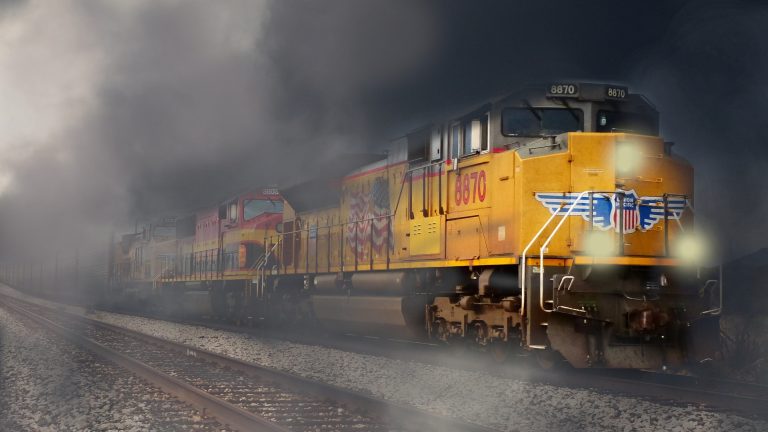For decades, railroad workers have been exposed to a range of toxic chemicals while performing their daily duties in rail yards, on locomotives, and along the tracks.
These substances—often present in the air, on surfaces, or embedded in materials like railroad ties and engine parts—are known to cause serious and often fatal illnesses.
Despite ever-increasing medical evidence, railroad employers have failed to warn workers about the dangers associated with prolonged exposure to these harmful agents.
Workers have been regularly exposed to diesel exhaust fumes, crude oil residues, solvents, asbestos insulation, and preservatives used in wooden railroad ties—without adequate protective equipment or ventilation.
One of the most common threats to railroad workers has been diesel exhaust exposure, which contains a toxic mixture of gases and ultrafine particles that penetrate deep into the lungs.
Long-term contact with diesel fumes has been linked to lung cancer, chronic obstructive pulmonary disease (COPD), and other serious lung diseases.
Benzene exposure—which occurs through contact with fuels, degreasers, and crude oil products—has been conclusively linked to blood-related cancers such as leukemia and multiple myeloma.
Railroad workers who handled or worked near asbestos-containing materials, such as brake pads, insulation, or gaskets, face a heightened risk of developing mesothelioma and asbestosis decades after exposure.
Even creosote-treated railroad ties, used extensively across the industry, emit toxic chemicals that have been associated with skin conditions and increased cancer risk through inhalation or direct contact.
The cumulative effect of these exposures, especially in enclosed spaces or confined work environments like engine rooms or roundhouses, significantly elevated workers’ risks.
Many of these illnesses develop slowly, with symptoms emerging years or even decades after initial exposure.
This makes early diagnosis difficult and establishing the condition to work exposure even more complex.
Common railroad-related toxic exposures and the illnesses associated with them include:
- Diesel Exhaust Exposure: Linked to lung cancer, chronic obstructive pulmonary disease (COPD), asthma, and chronic bronchitis.
- Benzene Exposure: Linked to leukemia, non-Hodgkin’s lymphoma, multiple myeloma, anemia, and immune system disorders.
- Asbestos Exposure: Linked to mesothelioma, asbestosis, and lung cancer.
- Crude Oil and Solvent Exposure: Linked to bladder cancer, liver toxicity, kidney cancer, and neurological issues.
- Creosote from Railroad Ties: Linked to skin cancer, respiratory irritation, and chronic dermatitis.
- Silica Dust from Ballast Work: Linked to silicosis, lung cancer, and other lung diseases.
These exposures were not rare or accidental—they were widespread, repeated, and preventable.
Today, many retired railroad workers are living with the consequences of years spent in toxic work environments.
Understanding the source of these illnesses is the first step toward justice.
Filing a claim helps workers and their families access the medical support and fair compensation they deserve after a life-altering cancer diagnosis.
What Railroad Workers are Especially at Risk?
Certain railroad employees face higher risks of cancer and other serious illnesses due to the nature of their jobs and the environments in which they work.
These workers often spend long hours in enclosed spaces, around running locomotives, or using equipment that emits toxic fumes.
Their daily duties place them in direct contact with diesel exhaust, asbestos, benzene, and other harmful substances.
Below is a list of railroad job roles particularly vulnerable to toxic exposure, along with explanations of their tasks and associated risks:
- Train Engineers: Operate locomotives and spend long hours in engine cabs, frequently exposed to diesel exhaust, asbestos from heating systems, and poor ventilation, especially when running long-nose forward or through tunnels.
- Brakemen: Work outdoors and in railyards connecting and disconnecting train cars, often near idling engines and equipment, putting them at risk of inhaling diesel fumes and airborne contaminants from fuel and lubricants.
- Conductors: Coordinate train operations and often ride in trailing locomotives where diesel exhaust seeps into poorly sealed cabs, leading to prolonged exposure during long hauls or deadheading trips.
- Carmen and Mechanics (Car Department Workers): Inspect, repair, and maintain railcars, frequently using solvents, degreasers, and welding equipment, exposing them to benzene, welding fumes, and asbestos-containing brake linings.
- Machinists, Pipefitters, and Electricians (Locomotive Shop Workers): Perform maintenance and repairs on engines and components using hazardous substances like degreasers, lubricants, and asbestos-laden materials, with daily exposure linked to multiple forms of cancer and respiratory illness.
- Track and Engineering Department Workers: Work in confined spaces such as tunnels and buildings, often using diesel-powered equipment and being exposed to creosote-treated ties, silica dust from ballast, and herbicides from track maintenance.
These roles form the backbone of railroad operations—but they’ve come with significant health risks.
For many workers, their daily environment was a source of invisible and long-term danger.
Types of Cancer and Other Serious Illnesses Suffered by Former Railroad Workers
Years of exposure to toxic substances on the job have left many former railroad workers facing devastating cancer diagnoses.
Machinists, electricians, pipefitters, conductors, engineers, and car department workers were regularly exposed to diesel exhaust, asbestos, solvents, welding fumes, and benzene-containing products—often in confined or poorly ventilated environments.
These carcinogenic exposures were routine across rail yards, maintenance shops, and inside locomotive cabs, yet few protective measures were in place to shield workers from long-term harm.
Today, medical research has confirmed strong links between these substances and a wide range of cancers and blood disorders.
Below is a list of cancers and serious illnesses commonly suffered by former railroad workers:
- Lung cancer
- Mesothelioma
- Laryngeal cancer
- Bladder cancer
- Kidney cancer
- Stomach cancer
- Colorectal cancer
- Throat cancer
- Pancreatic cancer
- Acute Myeloid Leukemia (AML)
- Myelodysplastic Syndrome (MDS)
- Non-Hodgkin’s Lymphoma
- Multiple Myeloma
- Liver cancer
- Silicosis
- Chronic Obstructive Pulmonary Disease (COPD)
- Reactive Airway Disease
These illnesses often take decades to appear, leaving many retirees unaware that their workplace exposures are to blame.
For those affected, a legal claim may be the only way to hold railroad employers accountable for years of preventable suffering.



